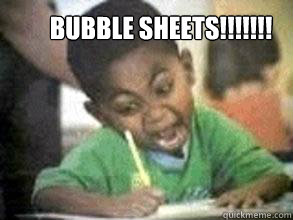1) Wesch,
From Knowledgable to Knowledge-able”
2) Argument
Wesch’s argument is that the
role of a student should progress from simply memorizing and reiterating material,
to being proactive and engaging in material. Wesch also wants students to learn
more about and engage more in real world issues that have greater implications
than trivial information on tests that won’t be remembered once the class is
done and over with anyway. Wesch uses this video below that he made to show
what students really think about their classes.
The students admit to not
paying attention in class and buying books that they never read. I don’t think
Wesch is saying that this is students’ faults though. Rather, I think the
teaching style has a lot to do with a student’s attitude. At the school he
taped this video at there were a large number of students sitting in big
lecture halls. One of the students even said something about her teachers not
knowing her name. Not only would a class size influence the format of the
class, but the assignments do as well. Wesch gives the example of the bubble
sheet tests no longer being appropriate.

 When Wesch was talking about this, I was
reminded of the idea of progressive education. Progessive Education includes: emphasis on learning by doing, understanding
and action as the goals of learning as opposed to rote knowledge, collaborative
and cooperative learning project, education for social responsibility and democracy,
personalized education, integration of community service and service learning
projects into the daily curriculum, selection of subject content by looking
forward to ask what skills will be needed in future society, de-emphasis on
textbooks in favor of varied learning resources, and an Emphasis on lifelong
learning and social skills. (Taken from
the wiki website) I think this kind of education would better please Wesch. Not
only that, but students may be pleased more as well. One of the comments on
Wesch’s article was that the way students take classes now is like getting vaccinations.
Once the class is over with, they’re done with it and the material that goes
along with it. The students have already “had” the class just like they have “had”
a shot. Maybe a better teaching style would allow students to carry on more
information past the final exam and use it in the real world.
When Wesch was talking about this, I was
reminded of the idea of progressive education. Progessive Education includes: emphasis on learning by doing, understanding
and action as the goals of learning as opposed to rote knowledge, collaborative
and cooperative learning project, education for social responsibility and democracy,
personalized education, integration of community service and service learning
projects into the daily curriculum, selection of subject content by looking
forward to ask what skills will be needed in future society, de-emphasis on
textbooks in favor of varied learning resources, and an Emphasis on lifelong
learning and social skills. (Taken from
the wiki website) I think this kind of education would better please Wesch. Not
only that, but students may be pleased more as well. One of the comments on
Wesch’s article was that the way students take classes now is like getting vaccinations.
Once the class is over with, they’re done with it and the material that goes
along with it. The students have already “had” the class just like they have “had”
a shot. Maybe a better teaching style would allow students to carry on more
information past the final exam and use it in the real world.
3) For
Class:
I agree with Wesch’s argument and
think that education should be different. Students should be “knowledge-able. My
question to the class would be: do you think Wesch makes a good argument or are
you more in favor of the traditional teaching style?
I really like your blog, and agree with what you wrote (test, not knowing names).
ReplyDelete- In my blog, I hope it is okay if I use yours for extended comments.
Thanks :)
Delete"At the school he taped this video at there were a large number of students sitting in big lecture halls. One of the students even said something about her teachers not knowing her name. Not only would a class size influence the format of the class, but the assignments do as well". <--- it seems to me like even college educators are no longer involved, eager, or taken back by the lack of attention students pay to them. Maybe we are all just brainwashed by the systems of oppression placed upon us so subtly that we don't realize how damaging this is for our present and our future. Colleges now raise book prices into the hundred dollar ranges, and fill classes beyond capacity because of the intake of capital by doing so. This is so funny because on the first day of my PSYCH class I was enrolled in had NO SEATS! I was like you have got tone kidding me I tried and tried to contact the professor no response! I dropped the class I had no choice there was no interaction or communication that it just unheard of! Great post you brought up very important facts!
ReplyDeleteGreat blog post! I like that you take note of the problems with the system of learning itself, and point out that it is the fault of the system. I watched his TED talk rather than reading the article, but I think based on your summation of it (and on what I watched) that I would agree with Wesch's argument.
ReplyDeleteTo answer your question to the class I take the stance it doesnt have to be an either/or scenario.
ReplyDeleteI like your use of color and the bubble sheet kid made me crack up.